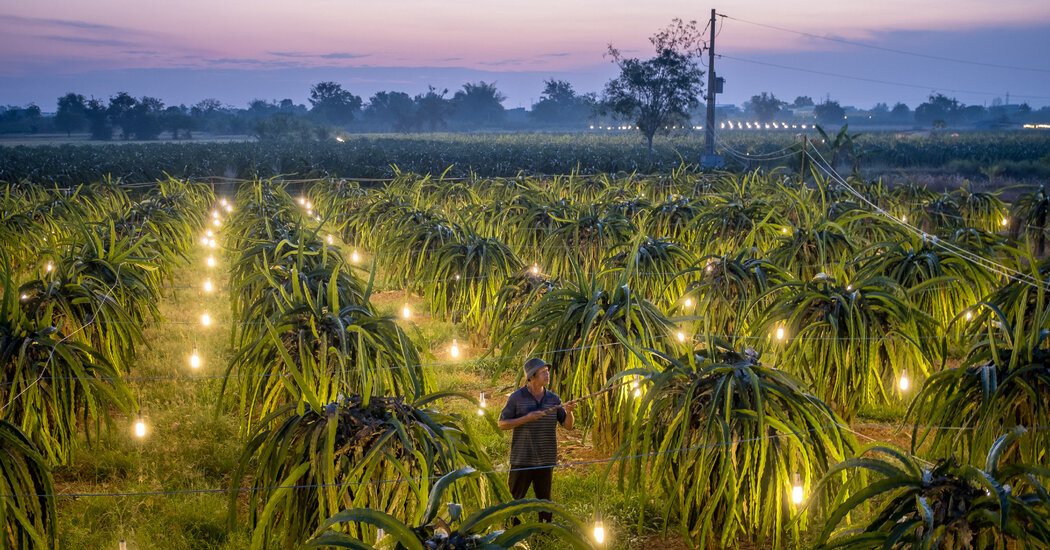
HANOI, Vietnam — At Pham Thanh Hong’s dragon fruit orchard in Vietnam, most of the lights are turned off. All is silent except for the periodic thud of the ripe pink fruit falling to the ground.
Mr. Pham, 46, is not bothering to harvest them.
The farmer watched dragon fruit prices plummet by 25 percent in the last week of December to near zero, pushed down by what several officials in Vietnam say is China’s “zero-Covid” policy. “I’m too disheartened to use my strength to pick them up, then throw them away,” Mr. Pham said.
Selling fruit to China in the coronavirus pandemic is not for the fainthearted.
China has gone to great lengths to keep the virus out of its borders. It has screened mail and tested thousands of packages of fruit and frozen foods despite little evidence that the virus can be transmitted through such products. It has locked down entire cities, leaving Chinese citizens stranded without medicine or food.
That strict virus policy has also had alarming consequences well beyond China. Southeast Asian fruit farmers are especially vulnerable because so much of the region’s exports are directed toward the country. In 2020, the total fruit exports from Southeast Asia to China stood at roughly $6 billion.
“If they buy, we’re alive. If they don’t, we’re dead,” Mr. Pham said. “We are growing dragon fruit, but it pretty much feels like gambling.”
Long lines of trucks arriving from Vietnam, Myanmar and Laos are now backed up on China’s border crossings. Dragon fruit farmers in Vietnam, who export mostly to China, have been pushed heavily into debt.
In Myanmar, watermelon exporters are dumping their fruit on the border because truck drivers have been told to quarantine for 15 days before they can bring the goods into China.
The restrictions appear to have especially hurt Vietnam’s dragon fruit farmers. After nine cities in China said they had detected the coronavirus on dragon fruit imported from Vietnam, the authorities shut down supermarkets selling the fruit, forced at least 1,000 people who had come into contact with the fruit to quarantine, and ordered customers to be tested.
Then, in late December, China closed its border with Vietnam for the first time during the pandemic.
Learn More About Lunar New Year
The holiday, which this year falls on Feb. 1, is widely celebrated around the world — and always with good food.
“China did not tell Vietnam anything in advance,” said Dang Phuc Nguyen, general secretary of the Vietnam Fruit and Vegetable Association. “They acted very suddenly.”
More than a million Vietnamese dragon fruit, mango and jackfruit farmers have been affected by the curbs, according to Mr. Dang. China accounts for more than 55 percent of Vietnam’s $3.2 billion in fruit and vegetable exports, chief of which is the dragon fruit.
Pham Thi Tu Lam, a farmer from Vietnam’s Vinh Long Province, said she decided to switch from growing oranges to dragon fruit in 2015. At that time, she could fetch $1.22 for one kilogram, or a little over two pounds, of the fruit. Now, because prices have plunged to a tenth of that, she has had to abandon 1,150 of the concrete posts where the plants are typically grown.
Unable to find any buyers, she gave most of last year’s harvest to her neighbors, used it for chicken feed or tossed it. She had invested more than $1,300 and three months into growing the dragon fruit. “All of which is now gone, with nothing left,” she said.
The ripple effects of China’s zero-Covid policy have accelerated discussions about Southeast Asia’s dependence on the world’s second-largest economy. They have also coincided with growing anxiety in the region over Beijing’s presence in the South China Sea, disputed waters that many Southeast Asian nations claim as their own.
“Until Covid, it seemed to me that the economic influence of China was so great in Southeast Asia that all those countries, notwithstanding the political tensions, were gravitating more toward the Chinese orbit,” said Bill Pritchard, a professor at the University of Sydney who has studied Southeast Asia’s fruit trade with China. “I think this has been some sort of a road bump on that. Whether it’s permanent or whether it’s temporary, I don’t know.”
For more than a decade, fruit farmers in Southeast Asia have capitalized on a rising Chinese middle class that has become increasingly health conscious. They also benefited from a robust road and highway network linking their countries to China.
Many of them had high hopes for the Lunar New Year, during which plates of cut tropical fruit are common features at dinner tables across China during the weeklong holiday.
Chinese authorities reopened the border with Vietnam last month, but they have not relaxed their screening measures. In late January, roughly 2,000 vehicles were stuck at the border, down from 5,000 in mid-December, according to Mr. Dang of Vietnam’s Fruit and Vegetable Association. Vietnamese officials have told businesses to avoid the crossing for now.
Nguyen Anh Duong, a director specializing in economics at Vietnam’s Central Institute for Economic Management, said the Vietnamese government is trying to help farmers find alternative markets, including diverting dragon fruit to local supermarkets in Vietnam.
But diversifying from China will be difficult. Using planes and ships to send fruit to other countries would drive costs higher. Several of the fruit-growing regions in Southeast Asia are not close to airports.
For now, fruit farmers are bracing for greater hardship.
Aye Myo Kyi, a watermelon farmer in Myanmar, said he had to throw his watermelons away when China clamped down on the border with Myanmar in April 2021.
“I have never lost money like this before,” said Mr. Aye Myo Kyi, who has been selling watermelons since 2010. He said he has now switched to selling beans domestically.
Thai exporters who usually ship their fruit through Vietnam and Laos, which share crossings with China, have been frustrated with government leaders for not helping them manage their losses.
Worakanya Panyaprasertkit, a longan exporter in Thailand, said a shipment of her fruit was stuck at the border with Vietnam for 60 days. By the time China announced it would open its border crossing with the country in January, most of the fruit had already gone bad.
“We have complained to different agencies, they know about our problems, but even then we haven’t seen any progress,” she said. “They are leaving us to fight for our own lives.”
The exporters do not expect the situation to ease until after the Winter Olympics end in Beijing on Feb. 20. China is also trying to stamp out several outbreaks of the Omicron variant at home, which could lead to even more stringent border screenings.
Patchaya Khiaophan, vice president of marketing for the Thai Durian Association, said she expects China to continue to periodically open and close its borders in the coming months. Thailand is developing disinfectants to spray on containers of durian for export and tightened the safety and packaging standards for the spiky fruit in time for the harvest in April.
“We have to reassure the Chinese side that Thai durian is free from Covid,” said Ms. Khiaophan. “We have prepared our farmers and business people,” she said. “For me, I don’t have high hopes.”
Vo Kieu Bao Uyen reported from Vietnam and Sui-Lee Wee from Singapore. Muktita Suhartono contributed reporting from Bangkok. Amy Chang Chien contributed research.







